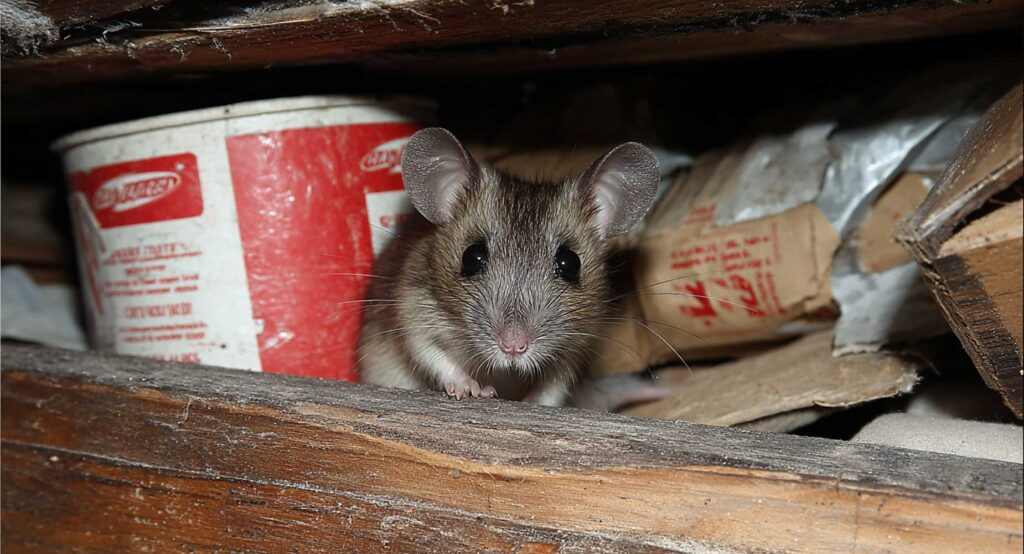Rodent Season on the SouthCoast: Stop Mice & Rats Before Winter
As temperatures drop across New England and Massachusetts’ South Coast, rodents become the number one pest pressure for homes and small businesses.
Mice and rats don’t “hibernate”—they move in, seeking warmth, food, and nesting sites inside basements, garages, kitchens, and attic voids.
Why Rodent Activity Spikes Now
- Survival drive: When outdoor food sources disappear and nights turn cold, rodents follow heat and scent trails through tiny gaps (mice can compress through ¼-inch openings).
- Shelter and food: Bulkheads, fieldstone foundations, utility penetrations, and attached garages provide easy access to pantries, pet food, birdseed, and trash.
- Fast reproduction: A few mice in November can develop into a whole colony by January without intervention.
Common SouthCoast Offenders (and the Signs)
- House Mouse: Small droppings (rice-grain size), skittering in walls, shredded paper/insulation nests, gnaw marks on food packaging.
- Deer Mouse: Similar to house mice but more common in rural/wooded areas; droppings near sheds/garages, stored equipment, or seasonal homes.
- Norway Rat (city & coastal neighborhoods): Larger droppings, burrows near foundations, greasy rub marks along baseboards, gnawed trash bins; activity often starts in garages, crawlspaces, and utility rooms.
Health & safety risks: Food contamination, allergens from dander/droppings, and gnawed electrical wiring (a fire hazard). Rodents can also damage HVAC lines, insulation, and stored goods.
DIY vs. Professional: What Actually Works
Traps catch individual rodents; exclusion and sanitation are the solutions to the problem. For lasting relief, combine:
- Inspection & Mapping: Identify runways, droppings, rub marks, and entry points from roofline to foundation.
- Exclusion (“Seal-Out”): Install door sweeps; seal gaps around pipes and wires with steel/galvanized mesh + sealant; repair torn screens; cap dryer and attic vents; weather-strip garage doors.
- Targeted Elimination: Strategic trap placements (and professional-grade devices) where rodents travel—avoiding risks to children and pets.
- Sanitation & Scent Removal: Secure trash, elevate and seal pet/bird food, vacuum droppings with proper PPE, and reduce clutter that offers harborage.
- Monitoring & Follow-Up: Re-checks to confirm activity is eliminated and the structure stays tight.
Homeowner Checklist: Close the Door on Rodents

- Foundation & bulkhead: Seal cracks; repair bulkhead gaskets; screen sump pump and utility penetrations.
- Garage: Replace worn weather-stripping; install a tight bottom seal; keep snacks/pet food in sealed bins.
- Utility lines: Seal around gas, A/C, cable, and irrigation lines; add rodent-proof vent covers.
- Soffits & roofline: Screen attic vents; fix fascia gaps; trim branches 10 feet from the roof.
- Food & trash: Use lidded, chew-resistant containers; clean under appliances; stop overnight pet feeding.
- Yard & storage: Move firewood and debris off the house; elevate items; reduce stacked cardboard.
- Bird feeders: If you feed birds, place feeders away from structures and police spills.
Our Integrated Rodent Program
Padanaram Pest Pros uses an Integrated Pest Management (IPM) approach tailored to SouthCoast homes:
- Full-structure inspection with evidence mapping.
- Exclusion first—we harden the exterior so new rodents can’t replace the ones that have been removed.
- Targeted trapping—no blanket “bait-and-hope.”
- Data-driven follow-ups—we confirm activity is down and entry points remain sealed.
- Prevention plan—seasonal checks and homeowner tips to keep things tight.
Quick Note on Overwintering Insects
Alongside rodents, many SouthCoast homes see cluster flies, boxelder bugs, and brown marmorated stink bugs gathering on sunny siding in fall and turning up in living spaces over winter. If that’s happening, ask about exterior exclusion and targeted treatments—but rodent control should stay priority #1 now.
When to Call a Pro
- Night sounds or pet “alerting” at walls/ovens/refrigerators
- Fresh droppings, gnawing on food packaging, or grease marks along baseboards
- Burrows at the foundation, garage/attic activity, or repeated trap catches
- Rental, restaurant, or storefront settings where health code and brand reputation matter
Service Area
We proudly serve Dartmouth, New Bedford, Fairhaven, Mattapoisett, Marion, Acushnet, Westport, and Fall River—and surrounding SouthCoast communities.
FAQs
Are rodents still active in deep winter?
Yes. Once inside, they stay active year-round. Winter is often when infestations accelerate because food and shelter are conveniently indoors.
How long does elimination take?
Light mouse activity can be controlled in 7–14 days with proper seal-out and trapping. Larger, multi-entry infestations or rat issues may require several weeks plus follow-up.
Do you offer pet-safe options?
Yes. Our program prioritizes non-chemical controls and exclusion, with trap placements and products selected to protect children and pets.
Can you seal entry points?
Yes. Exclusion is the cornerstone of our service. We identify and fix access points so the problem doesn’t return.
Need help fast?
Schedule an inspection with Padanaram Pest Pros and shut down rodent season before it takes hold. A well-structured plan and targeted approach now will keep your home healthy, quiet, and rodent-free all winter.
Resources:
- CDC “How to Clean Up After Rodents”:
https://www.cdc.gov/healthy-pets/rodent-control/clean-up.html CDC - EPA “Integrated Pest Management (IPM) Principles”:
https://www.epa.gov/safepestcontrol/integrated-pest-management-ipm-principles epa.gov - Mass.gov “Pests in buildings” overview:
https://www.mass.gov/lists/pests-in-buildings mass.gov

